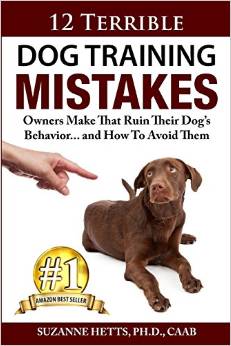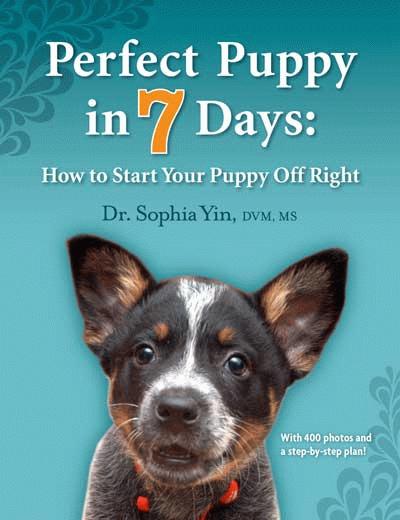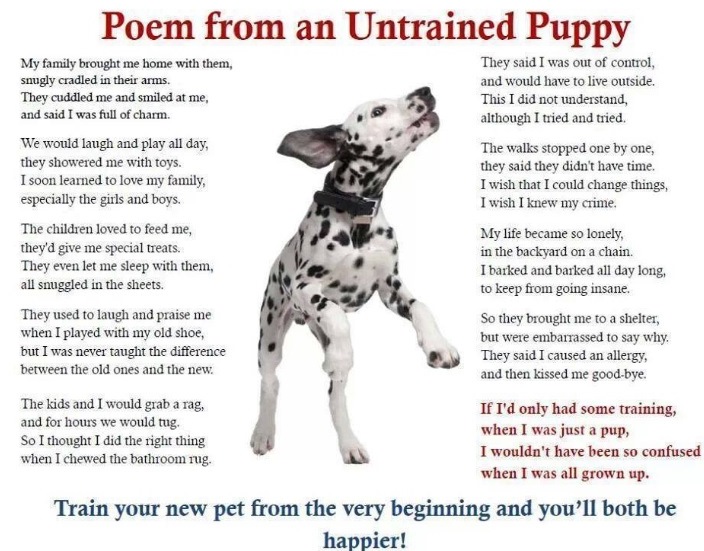There is confusing and conflicting information from breeders, vets, trainers and other people who have owned a dog about how best to raise a puppy. Some of the advice is totally wrong and some potentially dangerous!
Going for 4-5 hours to a good puppy school between the age of 8 to12-14 weeks is undoubtedly one of the best things that can happen to any puppy. However, it is only a fraction of what is needed for a puppy to become a dog that is emotionally healthy and well behaved.
Going to a bad school [puppies that are too old and too big, too many puppies and people, too small a room, unqualified and/or inexperienced instructor, incorrect techniques] is one of the very worst things that can happen to it!
With individual coaching an owner gets immediate feedback and reinforcement for correct handling skills, as a result of which their puppy is likely to learn very quickly. In group classes this instant feedback is not consistently possible.
One-on-one training in a home environment consistently gives superior results compared to even the very best of puppy classes which is why we decided, in 2012, to discontinue our much sought after group classes in favour of in-home tuition only.
'Puppy kindergarten DVD was particularly well done: clear and simple and inspiring. I love your passion for training (which you have without being militant), your passion for dogs and the resources you bring. I found your session to be money very well spent (and very convenient to be at home!)' 5/4/13 Dr D.Mills, Deception Bay, 'Whiskey', 12 week old Jack Russell
INCLUDED IN ALL PUPPY SCHOOL TRAINING
In just one individual home puppy-school training session we cover the following skills that a puppy owner should first teach their new puppy in a non-stressful home environment.
- House training.
- Socialisation – [learning how to live in our human world]
- Environmental habituation – [calmly accepting various stimuli such as sounds, motions and potentially scary objects]
- The puppy’s name – [means look at me for instructions and should never to be used as a reprimand]
- Yes – [what you did just then is right and some sort of reward will follow so do it again often]
- No – [said without 'nagging': what you are doing right now is not desirable and must stop right away]
- Come – [can save a dog’s life]
- Sit – [other behaviours, such as jumping up, can’t happen]
- Walking on a loose lead – [walks should be frequent and pleasant]
- Home alone – [how to play with toys and be happy in his or her own company]
 |
 |
 |
AFTER PUPPY SCHOOL
Once they have mastered the basics at home - a process that when done correctly takes only a few days - we recommend one or more of the following steps for an adolescent puppy’s ongoing education.
1. If young enough (8-12 weeks) they start at a good 4-5 week puppy school for hourly sessions, even if that means driving long distances to find the right place.
2. Once or twice a week for 2-3 months they attend a good ‘dog-day-care’ centre for 6 hours a day. There they will learn dog body language by playing and interacting appropriately with other well mannered puppies and older dogs.
There are also some private homes which, like day care for small children, take in puppies aged 8 -16 weeks for half or a whole day and allow opportunities for controlled play.
3. They continue to socialise their dog appropriately by visiting a nearly empty dog park. It is best to start by watching calmly and safely from the outside to ensure there are no inattentive owners with out of control dogs.
4. Owners wanting a higher standard of obedience might consider joining a small group obedience class. If so, find one with an experienced instructor using modern training methods.
N.B. It is wise to choose carefully as any negative experiences received at day-care centres, dog parks or classes can traumatise puppies and adolescent dogs and lead to life-long fear-based behaviour problems.
Good choices result in having a puppy that grows into a dog that is responsive to instructions and is polite around the house. He or she will interact well with people and other dogs when walking around the block or at the dog park.
Such a puppy is unlikely to be re-homed or sent to an animal shelter before he or she is 12 months old, nor require expensive visits to veterinary behaviourists for serious behaviour issues.
Details of our 'Fees', 'The Benefits of Home Training' and 'Recent clients' comments' can be seen by returning to the menu at the top and scrolling down to the relevant section.
If you would like our assistance to ensure your puppy has a head start to life and becomes an ideal family member please contact us on 0468 990 050 to arrange a suitable time.
For any further details please ring us on 0468 990 050. If nobody can take your call please leave a message and we will ring you back as soon as we return.



